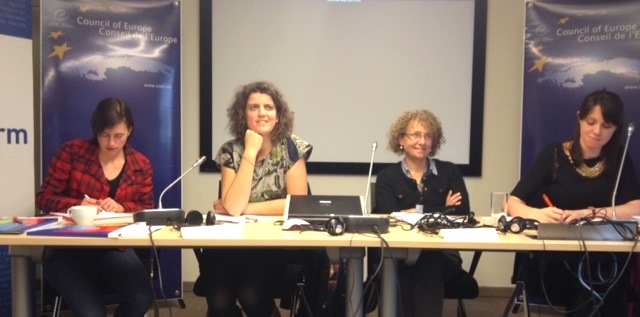Collective complaints mechanism: a successful advocacy tool
On January 29 Social Platform and the Council of Europe held a training on ‘How to make the best use of the Collective Complaints Mechanism under the European Social Charter’. Around 20 European NGOs participated as well as several members of the European Committee of Social Rights.

(Photo from left: Pierre Baussand, Luis Jimena Quesada and Regis Brillat)
During the first session of the training Mr Regis Brillat (Executive Secretary of the European Committee of Social Rights) presented the collective complaints procedure and how it can be used by NGOs. Out of 43 member states, 15 have ratified not only the Social Charter but also the collective complaints mechanism. The complaint can lead to ‘immediate measures’ where the government will be invited to freeze procedures or take essential measures. Compared to ECHR cases the complaint mechanism does not require all national remedies to be exhausted and the time until decision is shorter. Even if the decision is not binding in many cases it leads to changes at national level, in legislation or in interpretation.
Mr Luis Jimena Quesada (President of the European Committee of Social Rights) stated that the main purpose of legislation should be its effective implementation. The use of the (non-binding) collective complaints mechanism can sometimes yield more results and lead to important decisions and changes.
The second session was dedicated to an exchange of views among NGOs about their experiences of lodging complaints.

(Photo from left: Samara Jones, Marieka Vandewiele, Marie Cécile Renoux and Alison Coleman)
Marie Cécile Renoux, ATD Quart Monde shared her experience of lodging a complaint together with FEANTSA in 2006 against France regarding extreme poverty and the right to housing. The individuals did not have access to running water or electricity and were repeatedly evicted from their homes leading to among others their children not being able to attend school. The Committee acknowledged that France was not implementing its legislation on the right to housing. The result of the complaint was that the families’ voices were finally heard and since then, France has introduced new legislation enforcing housing rights. Ms Renoux urged other NGOs to also lodge complaints as it has been a successful tool for ATD Quart Monde.
Marieka Vandewiele, IPPF-EN told about their recent complaint against Italy on the implementation of their abortion law where doctors can reject to perform an abortion based on their consciousness and if the women’s life is not in danger. According to the law, hospitals must ensure that women are given the service but considering 70 percent of doctor’s object the hospitals cannot guarantee the service and in practice women do not have access to abortions. In terms of advocacy it was a success leading to the biggest trade union in Italy lodging a similar complaint from the perspective of discrimination of doctors that do not object and women’s health. IPPF-EN had good support from partners in Italy, such as the cabinet of lawyers and the Gynaecological Association in Italy. The decision will be made public in mid-March 2014.
Samara Jones, FEANTSA have a long experience with collective complaints against France 2006, Slovenia 2008 and the Netherlands in 2012 on the right to housing. Ms Jones gave some tips on how EU NGOs need good connections with national and local member organisations or other partners on the ground to identify the issues and gather research and data. A complaint requires some work on an EU level but most is done at a national level. FEANTSA has used their networks and pro-bono lawyers for drafting and advice.
The complaint mechanism is an advocacy measure to evoke people’s rights that governments do not respect. For example in Slovenia the laws were changed and it also positively affected the neighbouring countries. It is important to know what one wants to achieve; if it is to change the law, to have rights recognised or to get NGOs to work together on a national level. Ms Jones welcomed the cooperation with other NGOs and also recommended training national member organisations in the countries that complaints can be filed in order to build capacity for the future.
Social Platform will continue the cooperation with the Council of Europe in order to increase awareness about the European Social Charter and the collective complaint mechanism.
Read also our Director's editorial about the training
2014-01-31













































